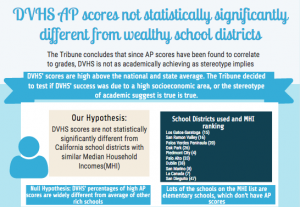District opens the door to AP’s with open access policy
October 3, 2018
District Spokesperson Elizabeth Graswich confirmed on Tuesday, Oct. 7, that the San Ramon Valley Unified District has a blanket “open access AP Policy.”
The policy, unveiled roughly two years ago, removes grade or testing requirements to take Advanced Placement (AP) classes, took the back-burner after the district announced other Personalized Learning initiatives. The initiatives centered around increasing options and improving student wellness by reducing “over-scheduling and student stress.”
While the two tenets seem at odds with each other, Graswich insists the move is only to “give families more options” but “the classes need to be the right fit for the student.” AP classes offer a way for students to get college credit for relatively cheaper than a college class.
Despite the fears of the previous administration, the decision did not open any floodgates, and no new resources were needed.
DVHS Principal Dave Kravitz noted that this site has unique impacts “because so many students do want and do take AP’s … They are in such high demand.”
Though not a result of the policy itself, “there is always… a strain on resources because of high demand,” Kravitz said. For example, “last year there were [approximately] seven sophomores College Prep social science classes but 14 to 16 AP social science classes. Most sites have the opposite distribution.”
However, some have raised the concern of overscheduling and encouraging unnecessary AP classes. While the district and school board have a 30-minute cap on homework a class can give per night, AP, Honors and Advanced classes are exempted from this regulation. At the moment, Graswich says there is no momentum to change this, as the “policy is fairly popular” and any changes would be pushed to “some point in the future.”
Kravitz confirmed that there are no plans, anywhere, to modify the policy.
“I know that students are up till midnight, 1 a.m., not just on test nights… We want a balance between overscheduling and balance healthy lives… If, in the future, there were discussions on changing the policy [I would be interested],” Kravitz told the Tribune.
Over-enrollment in AP classes is also a concern to teachers. According to Kravitz, there is “intense pressure” on teachers to succeed. They face pressure from students, parents and peers. “Some people just want to take AP classes for the GPA [boost],” Kravitz admitted, but he said that the policy “is not to keep kids out. It is to provide direction.”
Students, on the other hand, are divided in opinion. Senior Lexi Grimes disagrees with the policy shift because she believes that AP classes will be inundated by “unprepared” students who are only taking the class for a GPA boost, thus harming the quality of the class, student mental health and self-esteem. Senior Audrey Chong believes it will lead to “massive grade inflation.”
However, senior Amanda Yang contrasted this view, saying that “students can do whatever they want” and that she was surprised that the previous limitations had even stopped anyone from taking a class.


